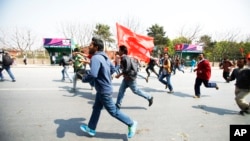NEW DELHI —
Nepal’s chief justice has taken over as prime minister, after the country’s fractious political parties agreed to let him organize new elections. This marks the end of nearly one year of political deadlock but there are concerns that naming the chief justice as prime minister could compromise the judiciary.
Supreme Court Chief Justice Khil Raj Regmi was sworn in as prime minister at a ceremony in the capital, Kathmandu, following a cross-party consensus that he should lead the country to elections.
It is an urgent task - Nepal has been without a parliament for nearly a year because major political parties could not reach a consensus on writing a new constitution for the country by the time its term expired.
Prime Minister Regmi will head an administration of 11 former officials.
The new government hopes to hold polls by June 21, but many observers say that the elections may be pushed back until November.
Political analyst Yuvraj Ghimire in Kathmandu says the new prime minister faces a challenging task. He points out there will be no politician in his government.
“The stumbling block is one whether a Cabinet that is fully packed with retired civil servants, without the cooperation of political parties, will be able to deliver in a system that is to be run by the politicians," said Ghimire. "This is an experiment, but this is also an admission on the part of the three or four parties that they were complete failure to run the government and complete the peace process.”
Although the main political parties have thrown their weight behind Chief Justice Regmi’s appointment as prime minister, there are many opposing voices - in the legal fraternity, in some sections of civil society and among several small political parties. They say his elevation to the post of prime minister is against democratic principles.
This includes a breakaway faction of the Maoist party, which held street protests in Kathmandu.
Ghimire says there are fears Regmi’s appointment could affect the independence of the judiciary.
“Supreme Court’s independence has come into question because new prime minister continues as the chief justice, although he says he will not be interfering in the day-to-day affairs of the court," he added. "The people’s diminishing faith in the judiciary will lead to a tendency perhaps to sort out issues on the streets rather than seeking judicial remedy.”
The political stalemate in Nepal has virtually paralyzed a peace process that began in 2008, after the country recovered from a long civil war. The former monarchy became a republic, but since then the country’s fractious political parties have been wrangling about the country's new form of government. Although the political uncertainty has eased, it has not ended with Regmi's appointment.
Supreme Court Chief Justice Khil Raj Regmi was sworn in as prime minister at a ceremony in the capital, Kathmandu, following a cross-party consensus that he should lead the country to elections.
It is an urgent task - Nepal has been without a parliament for nearly a year because major political parties could not reach a consensus on writing a new constitution for the country by the time its term expired.
Prime Minister Regmi will head an administration of 11 former officials.
The new government hopes to hold polls by June 21, but many observers say that the elections may be pushed back until November.
Political analyst Yuvraj Ghimire in Kathmandu says the new prime minister faces a challenging task. He points out there will be no politician in his government.
“The stumbling block is one whether a Cabinet that is fully packed with retired civil servants, without the cooperation of political parties, will be able to deliver in a system that is to be run by the politicians," said Ghimire. "This is an experiment, but this is also an admission on the part of the three or four parties that they were complete failure to run the government and complete the peace process.”
Although the main political parties have thrown their weight behind Chief Justice Regmi’s appointment as prime minister, there are many opposing voices - in the legal fraternity, in some sections of civil society and among several small political parties. They say his elevation to the post of prime minister is against democratic principles.
This includes a breakaway faction of the Maoist party, which held street protests in Kathmandu.
Ghimire says there are fears Regmi’s appointment could affect the independence of the judiciary.
“Supreme Court’s independence has come into question because new prime minister continues as the chief justice, although he says he will not be interfering in the day-to-day affairs of the court," he added. "The people’s diminishing faith in the judiciary will lead to a tendency perhaps to sort out issues on the streets rather than seeking judicial remedy.”
The political stalemate in Nepal has virtually paralyzed a peace process that began in 2008, after the country recovered from a long civil war. The former monarchy became a republic, but since then the country’s fractious political parties have been wrangling about the country's new form of government. Although the political uncertainty has eased, it has not ended with Regmi's appointment.




